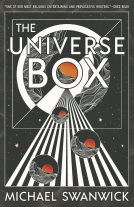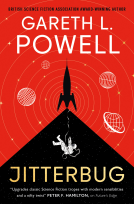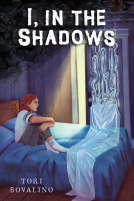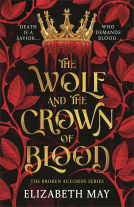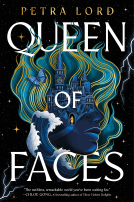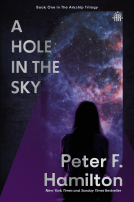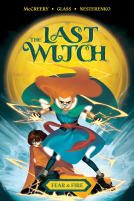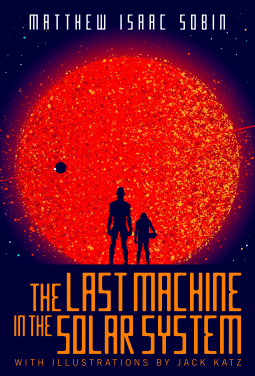
The Last Machine in the Solar System
by Matthew Isaac Sobin
This title was previously available on NetGalley and is now archived.
Send NetGalley books directly to your Kindle or Kindle app
1
To read on a Kindle or Kindle app, please add kindle@netgalley.com as an approved email address to receive files in your Amazon account. Click here for step-by-step instructions.
2
Also find your Kindle email address within your Amazon account, and enter it here.
Pub Date Apr 11 2017 | Archive Date Apr 11 2017
Description
Created to survive Earth’s destruction by our ever-expanding sun, Jonathan witnessed the end of life on Earth. This is his story and that of his creator, Nikolai. It is also the story of the human race, which failed to disentangle its destiny from the star that gave rise to all life-forms on Earth.
Advance Praise
"An engaging recondite science fiction treatise on mankind's synthetic evolution and manifest destiny, Matthew Isaac Sobin's The Last Machine in the Solar System begins where William Gibson and Bruce Sterling's The Difference Engine leaves us: a sentient machine contemplates life after man as it prepares to cut the cord." —Tal Klein, author of The Punch Escrow
"Sobin has created an AI who shares our terror and our wonder, our fleeting elegance and our inevitable flaws. By detailing the death of our star, Jonathan becomes an empathic eulogizer for humanity—perhaps a better one than we deserve. A fascinating read." —Scott T. Barsotti, author of Single Version
"An intriguing and wondrous journey. Through the eyes of Jonathan—a sentient machine—Matthew Isaac Sobin explores complex topics that range from love and empathy to the sheer relevance of humankind. Such deep flexions would be hard to navigate if it weren’t for the author’s crisp and soothing writing. The Last Machine in the Solar System reads like a poem to humanity, recited by a machine smart enough to understand our race." —Ricardo Henriquez, author of The Catcher's Trap
"A poignant, poetic expression of how limited mankind feels in this limitless universe. The Last Machine reminds us how far we could still go." —Joseph Asphahani, author of The Animal in Man
"The Last Machine is a heartfelt lament to hubris; a poetic account of 'what might happen when.' Sobin has something beautiful here, worth paying close attention to." —Elan Samuel, Book Reviewer at The Warbler
"A fascinating look at humanity that leaves you eager for more." —Paul Inman, author of Ageless
Available Editions
| EDITION | Other Format |
| ISBN | 9781942645191 |
| PRICE | $9.99 (USD) |
| PAGES | 80 |
Links
Average rating from 25 members
Featured Reviews
 Cindy M, Reviewer
Cindy M, Reviewer
This short but intense book is a grand mixture of science, science fiction, philosophy, theology and the ruminations of a lonely intellect randomly drifting through space for eons, heading towards it's final resting place. You might think that rummaging around in the "mind" of a machine would be stiff and unemotional. Not so! Jonathan is wise, thoughtful, introspective and loyal to his long-dead creator. His observations during his long journey are at once sad, inspiring and supremely logical, while at the same time... OK, yes, I'll say it... exquisitely heart-wrenching. I was SO pleasantly surprised by this book; it was light-years (pun intended) better than I ever expected it to be. I couldn't possibly recommend this novel more; wish Mr. Sobin would somehow follow this up with a sequel! Just absolutely superb.
 Jay B, Reviewer
Jay B, Reviewer
A super-interesting thought experiment: If a single intelligent machine was the only thing left in our solar system, having experienced our / mankind's present, and future, and demise, what would it's thoughts and emotions be?
This is a very nicely written novella examining this question, which it does quite well. Written in first-person from the POV of the machine, it looks at humanity's high achievements, considers our weaknesses, and postulates what our future might be.
A short, quick read that's worth your time if you enjoy thinking about how time might unfold for humanity.
 Reviewer 284049
Reviewer 284049
I received this ARC from Netgalley in exchange for an honest review.
This is a short story from the point of view of an android built to outlive the death of humanity, Earth, Mars, and our solar system in general. We witness his "birth", his experiences on Earth and later Mars, and eventually moves on to billions of years later when the sun has become a white dwarf.
Following the tradition of classic scifi, there is a lot of social commentary. One major point is how humans can accomplish a lot if we work together, but we're too driven by our individual selfish needs. It's very fitting for the isolationist tendencies we're seeing right now.
One quote I did thoroughly enjoy:
I think far more foresight was needed; once the layman can see the issue, it is already too late to remedy.
There's hard science in this, but I do think it's a case of, if you look too hard it'll become a bit fuzzy.
The author did state at the end that he was planning on making this into a full length novel. However, this does work very well at the current length.
 Brad H, Reviewer
Brad H, Reviewer
The Last Machine in the Solar System by Matthew Isaac Sobin
My rating: 5 of 5 stars
This novella hearkens back to the good old days of Asimov or the general Campbellian SF universe where we focus on the nuts and bolts of the universe, or in this case, the solar system, as our robot observer watches our old red sun engulf the planets.
Of course, humanity is long dead. We're talking billions of years and I have doubts about the next ten.
That being said, this novella is very contemplative and enjoyable, adding little fun reflections on creativity and Jonathan's birth as well, but mostly we've got some great jewels like terraforming mars and igniting Jupiter as either long-dead history or possibilities, and this is where the author shows his chops as someone who knows the SF field and is writing a love-letter to it.
The only complaint I have is one that the author already addressed at the end: It needs to be longer and he is writing more. :) I'm quite good with that. Thanks!
This is for anyone who loves the whole concept of our Solar System's death. Or maybe you're just in a mood. :)
Thanks goes to Netgalley for this ARC!
 Laken H, Librarian
Laken H, Librarian
This short story, told from the perspective of a machine built to outlive and document humanity, takes the long view of human evolution and considers the transience of our existence, and just what we will leave behind. For while the longevity of the machine nears immortality by human standards, its time spent monitoring and evaluating mankind's progress is simply inconsequential when compared to the celestial bodies that surround it. Moving from Earth to the far reaches of the solar system, this unique and contemplative tale of a single mechanical mind will compel readers to consider their place in the universe and their own mark on the world.
Readers who liked this book also liked:
John Kotter; Holger Rathgeber
Business, Leadership, Finance, Nonfiction (Adult)
L.M Montgomery
Children's Fiction, Comics, Graphic Novels, Manga, Teens & YA
